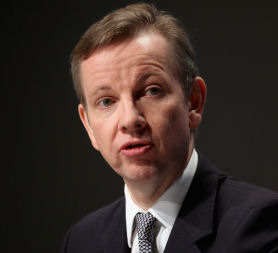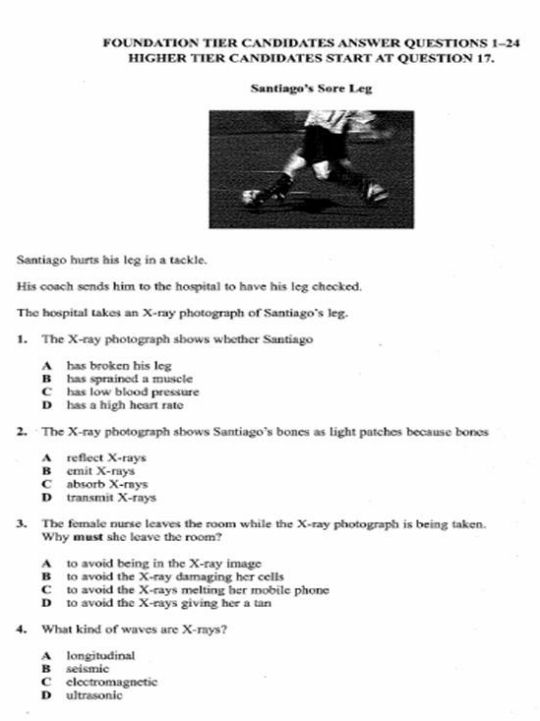FactCheck: bad science GCSEs?
Updated on 08 October 2009
Are science GCSE questions really as easy as the Conservatives claim? FactCheck puts them to the test.

The claim
"Let me read you some of the questions that we ask our sixteen-year-olds. In GCSE science we ask students if nurses leave the room during X-ray sessions in hospital for health reasons, or because their mobile phone might melt, or because they might get a tan.
"We ask students in GCSE science which is a better argument for nuclear power - creating jobs or creating toxic waste. We ask students in GCSE science which is healthier - a battered sausage or grilled fish."
Michael Gove, shadow schools secretary, speech to Conservative party conference, 7 October 2009
The background
More evidence of dumbed-down Britain? Yesterday in his speech to the Conservative party conference, Shadow Schools Secretary Michael Gove reeled off a list of pretty obvious-sounding questions from GCSE science papers.
"These aren't rigorous tests of scientific knowledge," he said. "They're terrifying evidence of how our educational establishment has presided over a comprehensive decline in examination standards."
But do Gove's questions make the grade? Let's turn over the exam papers.
The analysis
The questions were issued recently, the Tories said, by the exam board Edexcel - the last one from a June 2008 exam paper, and the first two from sets of sample exam questions.
Technically, this means the first two questions wouldn't actually appear on an GCSE paper - samples are given out to be used in class or as practice exam papers. Still, this doesn't detract from Gove's main point, that students are being asked questions that aren't up to scientific scratch.
But are they? Edexcel sent us the relevant pages of the exam papers, and the full questions aren't necessarily as simple as Gove's speech suggests.
Let's take them in order. There is a question on the foundation tier section of the sample paper - which would be taken only by students aiming for grades C-G rather than the top A*-C - that asks why a nurse must leave the room while an x-ray is being taken.
Four answer options are given, one more than Gove lists:
a) to avoid being in the x-ray image
b) to avoid the X-ray damaging her cells
c) to avoid the X-rays melting her mobile phone
d) to avoid the X-rays giving her a tan.
Secondly, Gove claimed that "we ask students in GCSE science which is a better argument for nuclear power - creating jobs or creating toxic waste."
And we do, in slightly more sophisticated, though not necessarily more scientific, terms than Gove suggests. Here's an Edexcel question in full:
Are exams getting easier? Read the FactCheck verdict on dumbed-down A-levels.
"The residents have a variety of thoughts concerning the siting of the nuclear power station.
"Two views are: 1 the nuclear power station will provide more employment in the area
2 Any release of radioactive material would be very dangerous.
"Which statements are arguments in favour of siting the nuclear power station here?"
Students then have to choose either a, b, c or d - one, two, one and two, or neither.
Finally Gove says that "we ask students in GCSE science which is healthier - a battered sausage or grilled fish."
This is part of a question in which students are given a list of items in an unhealthy meal, and asked to choose a healthier alternative. In the case of the battered sausage, they have to choose between fried sausages, grilled sausages or grilled fish. They also have to give a reason for their choice.
So there is a bit more to the questions than the sound bites suggest - but are they really all that's needed to get a science GCSE?
Over to the exam board, which points out that exam papers need to test candidates of all abilities.
An Edexcel spokesperson said: "It is necessary therefore to have a range of questions, which allow less able candidates to successfully answer and other questions which will stretch and differentiate the stronger candidates.
"It is not representative to simply pick one question, or part of a question from a paper and use it as evidence of the level being taught or tested."
And you do get a sense of this by reading a bit more of the exam paper.
Back to the question about the nurse and the X-ray. The next question on the paper asks, "What kind of waves are X-rays?" The options to choose from are a) longitudinal, b) seismic c) electromagnetic and d) ultrasonic. Not a mention of tans or mobile phones in sight.
The verdict
Gove does base his claims on genuine GCSE science questions, although the actual questions aren't in every case quite as simple as the sound bites suggest.
But this doesn't necessarily tell us that much about the overall range of standards being tested by the exam paper - there are examples of harder scientific questions rubbing up among Gove's choices.
FactCheck rating: 2
How ratings work
Every time a FactCheck article is published we'll give it a rating from zero to five.
The lower end of the scale indicates that the claim in question largerly checks out, while the upper end of the scale suggests misrepresentation, exaggeration, a massaging of statistics and/or language.
In the unlikely event that we award a 5 out of 5, our factcheckers have concluded that the claim under examination has absolutely no basis in fact.
The sources
Your views
You've read the article, now have your say. We want to know your experiences and your views. We also want to know if there are any claims you want given the FactCheck treatment.
Email factcheck@channel4.com
FactCheck will correct significant errors in a timely manner. Readers should direct their enquiries to the editor at the email address above.





